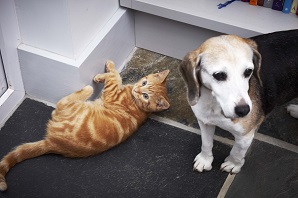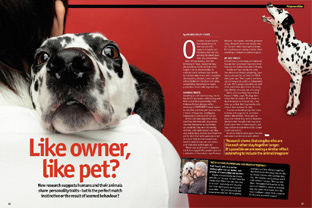Welcome to Petplan’s blog, a space where you can read up on the latest pet-news, find out interesting facts and tips about keeping your pets happy and healthy, and share your views on hot topics.
Refine articles by
clear searchProblems with your rabbit's teeth?

Are you becoming more and more like your pet?

How to worm a difficult cat

Q: Can you tell me any simple way to worm my cat Maude, whether using a tablet or another method? She’s a cantankerous old thing and I find it almost impossible to get a tablet down her without being badly scratched.
A: Tableting is one of the most common difficulties experienced by cat owners. Best undertaken by two people, a cat can be carefully wrapped in a towel to protect all involved from their sharp claws.
Using a plastic tableting instrument bought cheaply from your local vet clinic, tip your cat’s head back so that their nose points to the ceiling, gently opening the mouth before popping the tablet behind the tongue and quickly stroking the throat to encourage swallowing. If this process is impossible with Maude, some treatments in liquid form will kill all forms of intestinal worm commonly found in cats that live in the UK.
Available from your vet, these treatments are applied to the back of the neck like many flea treatments (some of which, incidentally, also treat gut worms), and get absorbed through the skin and into the bloodstream, before killing the worms present in the digestive tract. Used routinely every three months, this spot-on treatment may be the answer to your feline’s internal parasite problems.
Could your cat have gum disease?

Q: Our cat has started to be tentative around her food bowl, dropping pieces of meat and drooling. She also has awful breath. Given that she’s quite old, we’re worried what the vet will say. Any ideas what could be wrong?
A: Please don’t be frightened of your vet, as it sounds like your poor cat needs attention. It’s likely that her discomfort and drooling are due to a dental issue – maybe a rotten tooth or gum disease.
Even older cats can undergo anaesthetic as long as tests are done beforehand to ensure their general health, and this could greatly improve your cat’s quality and length of life. Chronic dental disease can lead to health problems including liver and heart disease, so do go and see your vet.
What to do with an aggressive cat

Q: My 12-year-old Burmese has started biting me hard whenever he wants food or attention, and generally grabs whatever food he can find. He doesn’t attack anyone else, but his behaviour towards me is becoming intolerable. Help!
A: Because your cat is 12 and has only just started to display this behaviour, I would take him to your vet in the first instance.
Some medical conditions can make cats irritable and constantly hungry, such as hyperthyroidism, and your vet may well recommend blood tests. In the meantime, as the aggression is mainly linked to eating,
I’d get into the habit of scattering a little dry food on the floor for him just before you walk out of the kitchen, so he’s kept busy looking for it. This would be part of his normal daily ration.
Providing a food activity ball may also help. Also, ensure you’re well protected, with thick slipper boots, thick trousers and socks.
If there is no medical cause, seek professional behaviour advice. Cat aggression can be a real problem, as cats carry bacteria in their mouths, and deep bites from them can cause potentially serious infections.
The dog ate what?

Watching what you eat? Start keeping an eye on your pets too, if these latest X-rays are anything to go by
Ask your vet about animals they’ve treated who have eaten things they shouldn’t have, and chances are they’ll have more than a tale or two. Because besides the odd mouthful of grass, our pets seem to have a strange – and sometimes dangerous – approach when it comes to snacking.
Here at Petplan, we’re seeing a growing trend in pets swallowing things they should steer well clear of, with claims coming in about Britain’s pooches eating everything from rubber ducks to golf balls and even cutlery. It’s not just dogs that are ultra-inquisitive either. Our feline friends also partake in culinary disasters, including one curious moggy that ended up gulping down a darning needle.
Vet Brian Faulkner has seen many cases like this throughout his career. ‘It’s important to be careful when leaving items lying around the house as pets love to explore and often end up eating things. Not only can this be painful or expensive to resolve, it can be potentially life-threatening.’
Barney, a Staffordshire Bull Terrier, managed to swallow a rubber duck after retrieving it from inside the bath tub.
Bobby Kirk, an eight-month-old West Highland Terrier, chowed down on a horse from a child’s play set.
A poodle crashed a dinner party and helped itself to a not-so-tasty spoon, straight off the table.
How to help your arthritic dog build stronger legs

Q: Our beautiful Alsatian has suffered badly with his hips as he’s got older, and has now developed osteoarthritis. An anti-inflammatory liquid keeps him comfortable, but his legs are shakier than ever, and the vet said there was very little muscle tone left. Is there anything I can do to help him rebuild muscle tone without making his hips more painful?
A: Hydrotherapy may be the perfect way to help stimulate the rebuilding of muscles in your German Shepherd’s back legs. With an inflatable harness placed around them, dogs are placed in a deep tank and allowed to swim. This builds up muscles and is a perfect non-weight-bearing exercise for arthritic joints.
You should also consider the use of chondroprotectants such as glucosamine and chondroitin sulfate, which will help to regrow healthier joint surfaces in your ageing dog.
Does spaying affect a cat’s coat?

Q: My beautiful Bengal cat Lydia is about six months old and I’m thinking of getting her spayed. The breeder said to be careful where the vet clips her for the surgery, as this could affect the colour of her coat. If this is true, what can I do about it?
A: I have seen this happen in the occasional cat, and I must say I’m not certain why. It is likely that the clippers irritate the skin and cause melanin, the skin’s natural skin pigment, to be produced, or that clipping disrupts the normal cycles of hair growth and moulting, leading to the patch of coat regrowing with a slightly different colour.
With cats such as Bengals, whose coats are prized for being so delicate and beautiful, it’s best to have them spayed via a midline incision over the belly, where any change in coat colour will not be as noticeable. Strangely, this unusual reaction does not seem to happen as much in domestic breeds as in more exotic varieties such as beautiful Lydia, but spaying is a good idea for all cats, so speak to your vet about your concerns before the procedure is completed.
Do car journeys stress out your cat?

Q: My son has a one-year-old rescue cat that is generally calm and friendly, but pees and poops whenever she travels by car in her cat carrier, even if she has used her litter tray shortly beforehand. Can you suggest why this could be?
A: Most cats are not used to travelling in cars and it can be very stressful for them. They are placed in a carrier, removed from their home territory and put in a noisy car.
Fearful situations such as this can result in a loss of bladder and bowel control. I would line the carrier with newspaper or old towels that can be thrown out after the journey.
Spraying the inside with a product called Feliway (available from vets or veterinary websites) 10 minutes before she is put into it may also help. To minimise any travel to veterinary appointments, your son could ask whether his vet offers the option of home visits or a mobile surgery
Is it safe to put your puppy under anaesthetic?

Q: Our fun-loving pug puppy has just started ‘getting a little funny’ around other male dogs, and my vet suggested castration. We’re really worried about Kato being put under anaesthetic for a procedure that isn’t essential, so should we steer clear?
We’ve researched the different types of anaesthetic and it seems that gas is the safest. Do all vets use this?
A: Castration is not a necessity, but it will help to reduce male-dominance aggression and the potential for prostate problems later in life, so it’s definitely worth considering seriously.
Almost all – if not all – vets in the UK use gas to maintain a pet under anaesthetic. Having said that, injections are also usually involved; it is very uncommon to solely ‘gas-down’ a canine patient for surgery.
I would suggest contacting your local vet to discuss the types of anaesthetic they use. This should help you feel more comfortable about the procedure, and to decide whether you want to go through with it.


